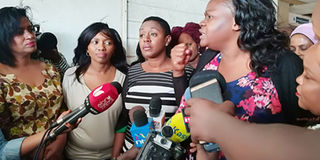Seeking key drivers to inspire change

Women MPs at Kenyatta National Hospital on January 20, 2018. PHOTO | FILE | NATION MEDIA GROUP
What you need to know:
- Prof Maathai’s life teaches us that where there is a challenge, there is space for a woman to emerge with a solution.
- While women comprise half of Kenya’s population, they own less than two per cent of the land and account for 19 per cent of the MPs and 27 per cent of the Senators.
- Kenya’s first Nobel Prize winner Wangari Maathai was an exceptional and inspirational woman.
- The long-standing views about the role of women in society are partly to blame for this inequality.
Wangari Maathai once said “human rights are not things that are put on the table for people to enjoy. These are things you fight for and then you protect.”
Kenya’s first Nobel Prize winner was an exceptional and inspirational woman. Her Green Belt Movement protected forests. By encouraging communities to tackle the problem of deforestation head-on, her movement created jobs for 900,000 girls and women living in the forests, planting more than 51 million trees.
Prof Maathai’s life teaches us that where there is a challenge, there is space for a woman to emerge with a solution. Consider the impact we would have if more women were driving change across business, media, civil society, and politics. The is a need to elevate their voices and create an environment where they are not just seen, but heard.
ACCESSING LOANS
While women comprise half of Kenya’s population, they own less than two per cent of the land and account for 19 per cent of the MPs and 27 per cent of the Senators. Despite the number of women involved in business, most women-owned businesses have difficulty accessing loans.
The long-standing views about the role of women in society are partly to blame for this inequality.
Some people believe girls and women cannot make the choices that serve their best interests and that they need to protection and guidance.
Recently, Kenyans were outraged by the news that over 300 girls sat for their national examinations from maternity hospital beds, either pre- or post-delivery.
PROTECTION
Some interpreted it as “proof” that girls cannot control their own bodies and, therefore, need protection. For many of these girls, pregnancy and early marriage are presumed to be the easier pathways to prosperity and a life with less struggle. Without access to information and services, girls and women are unable to make informed choices about their bodies, leading to unwanted pregnancies and subsequent school dropouts, and a cycle of poverty. It is all linked. But so are the solutions.
Research shows that girls and women who complete secondary school can earn two times more income than those who do not. Women with more education are less likely to marry early, can get paid more, and help to drive national economic growth.
Wangari Maathai approached deforestation holistically and as a human rights issue. She saw an opportunity to achieve long-lasting community change and drive economic empowerment for women.
When women own land, poverty levels decrease, business and enterprises flourish, and families become healthier and wealthier.
SOCIAL ISSUES
When women gain positions of authority they advocate social issues and invest in health and education for all.
When systems enable women to access loans, they grow their businesses, create jobs and invest back in their families and communities.
Luckily for Kenya, the foundations are there. The 2010 Constitution is one of the most progressive in Africa, with provisions guaranteeing inheritance rights and making marriage and the custody of children a more equitable process for women. taken important legislative steps by passing the Prevention of Domestic Violence Act, the Prohibition of FGM Act, and the Matrimonial Property Act.
President Uhuru Kenyatta was the second leader globally to sign the He-for-She campaign.
SUSTAINABLE DEVELOPMENT
We need to stop seeing women as another development challenge to be fixed and instead see them as part of the solution. That is why ‘Deliver for Good’ was launched in Kenya on Wednesday.
It is a campaign that seeks to apply a gender lens to the Sustainable Development Goals (SDGs) and reminds us that women are integral to our common goals.
The campaign also aligns closely to the ‘Big Four’ agenda, focusing attention around equal land rights, economic empowerment, political participation, and universal health care, including access to sexual and reproductive health services.
INITIATE CHANGE
‘Deliver for Good’ is unique because its strength lies in harnessing the skills and knowledge of many partners – from government, businesses and donors, to civil society, and the public – to inspire action towards gender equality.
The onus is on each of us to play a role in ensuring that our mothers, sisters and daughters are given the same opportunities as our fathers, brothers and sons.
Women don’t need your protection or permission. Women seek to drive their own agenda, initiate change, and shape society around them for the better. It’s now time to create an environment that nurtures more Wangari Maathais.
Prof Kobia is the Public Service Cabinet Secretary, and Ms Omondi, the Executive Director, FIDA-Kenya





